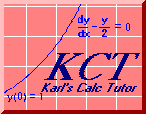

1) In the first expression we have the sum of two functions,
each of which
can be expressed
as xn, one where
In the second expression we have the sum of an xn and
an
2) This one should have been easy. The text of the problem observed that
a constant function is just a straight line function with a slope of zero
(i.e.,
3) A very quick argument for the first part is that:
g(x) = n f(x) = f(x) + f(x) + ... [n times] ... + f(x)Hence, by the sum rule,
g'(x) = f'(x) + f'(x) + ... [n times] ... + f'(x) = n f'(x)A purist, however, would do it by induction. To get onto the first rung of the ladder, we observe that for
g(x) = (1) f(x) = f(x)hence
g'(x) = f'(x) = (1) f'(x)So it works for
gn'(x) = n f'(x)whenever
gn(x) = n f(x)then
gn+1(x) = (n + 1) f(x) = (n f(x) ) + f(x)That the derivative of
gn+1'(x) = (n f'(x) ) + f'(x) = (n + 1) f'(x)And you have it proved by induction. But you only need to do it that way if you are performing for a stickler on formality.
As for the second part, you can observe that:
n u(x) = f(x)We know from the first part of the problem that:
n u'(x) = f'(x)Simply divide both sides by n, and your proof is complete.
Now, using the results from both of the parts of the problem, can you show that if:
u(x) = (n/m) f(x)and both n and m are counting numbers then:
u'(x) = (n/m) f'(x)
And using an argument similar to the one we used for the second part of
this problem, can you prove that the derivative of the difference is always
equal to the difference of the derivatives? Hint: if
email me at hahn@netsrq.com
Exercise 4: In each of the functions given, you must try to break the expression up into products and sums, find the derivatives of the simpler functions, then combine them according to the sum and product rules and their derivatives.
4a) Here you are asked to find the derivative of the product of
two straight line functions (both of which are in the standard
u'(x) = (m1 (m2x + b2) ) + (m2 (m1 + b1) )Ordinarily, I wouldn't bother to multiply this out, but I'd like to take this opportunity to demonstrate a method of cross-check. Multiplying the above expression out yields:
u'(x) = m1m2x + m1b2 + m1m2x + m2b1
= 2m1m2x + m1b2 + m2b1
If we multiply out the original u(x), we get:
u(x) = m1m2x2 + m1b2x + m2b1x + b1b2Try using the sum rule, the rule about xn, and the rule that about multiplying by a constant on this version of u(x) to demonstrate that the derivative obtained this way is identical to the one we obtained the other way.
4b) Here you are given the product of two quadratics. We do this
the same way as we did 4a. Let
u'(x) = ( (2x + 2) (x2 - 3x + 2) ) + ( (2x - 3) (x2 + 2x + 1) )which is the answer. If you want to multiply out u'(x) and u(x) to do the cross check, by all means do so. It's good exercise.
As further exercise, observe that the f(x) and g(x) we used in this problem are both, themselves, products, if you factor them:
f(x) = x2 + 2x + 1 = (x + 1) (x + 1) g(x) = x2 - 3x + 2 = (x - 1) (x - 2)Try applying the product rule to both of those and make sure you come up with the same expressions for f'(x) and g'(x) as we did in the first part of this problem (ie 4b).
4c) This is still the same problem as the two previous ones (ie 4a and
4b). Again, we find that u(x) is a product, and we set f(x)
and g(x) to the two factors respectively. So
u'(x) = ( (1) (4x4 - 7x3 + 2x2 - 5x + 8) ) +
( (x - 1) (16x3 - 21x2 + 4x - 5) )
4d) In this one you are given the product of two functions, one,
x2, explicitly, the other, f(x), as simply
a symbol for any function. So let
u'(x) = (2x f(x) ) + (x2 f'(x) )
4e) This problem is the difference of two products. You have to apply the product rule (equation 4.2-20b) to each product individually to find the derivative of each product. We have already seen that the derivative of the difference is the same as the difference of the derivatives. So to get the answer, simply take the difference of the two derivatives that you got using the product rule. I won't work the details for you here. You should be getting better at this by now. The answer is:
u'(x) = f(x) + xf'(x) - 3x2g(x) - x3g'(x)
email me at hahn@netsrq.com